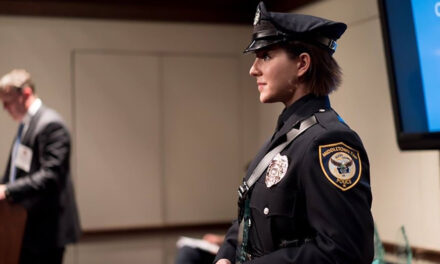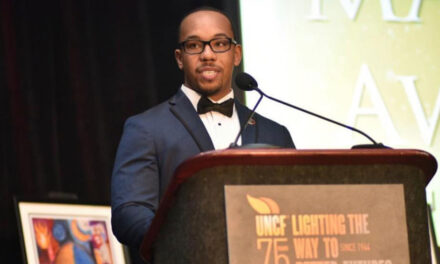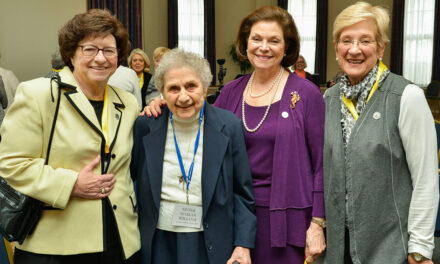How well do you relate to people who are different from you—people of other races or ethnicities, people with disabilities, sexual minorities, people of different ages or body sizes, and other kinds of differences, whether obvious or subtle?
Professor Francien Chenoweth Richardson, Psy.D., teaches Psychology of Human Diversity for doctoral students. “Studying the psychology of diversity over a semester can be quite intense, and many students will probably feel vulnerable at various points,” Richardson writes in the syllabus. She recommends that students cultivate an open mind and absorb feedback without becoming defensive. She also advises students to actively learn more about diversity issues and commit to increasing contact with people of other cultures. “Many people, including students, do not like the discomfort of talking about race,” notes Richardson, “but as the class progresses, the process of understanding the impact of oppression begins.”
Richardson assigns activities to help her students interact with minorities or experience being a minority. Students can choose to apply for welfare, attend a religious service that isn’t part of their faith, talk with someone of another religion, adopt another gender identity for a day, wear a blindfold to simulate having low vision or use a wheelchair for a few hours.
“This continuing education involves discomfort, shame, remorse, disappointment in my people, in myself—but also joy and discovery of others.”
Psy.D. student Regina Boylan ’25 chose to attend a Liberian women’s conference in Atlanta, Georgia and reflect on the experience. “This was the first time I, a white woman, was in the minority,” she wrote. “There was much talk about the politics in Liberia, and while I was eager to expand my worldview, I did not know much about governments outside of the United States and was ignorant of the challenges Liberians face daily. This ignorance led to immense discomfort.” Boylan reported feeling out of place, wondering if the Liberian women questioned her presence there. She was surprised when some of them thanked her for attending and expressed appreciation for her interest in their culture. “Attending the event allowed me to experience feelings and thoughts that other minorities experience daily,” Boylan commented.
Psychology professor Janet Etzi, Psy.D., has also taught some sections of the Psychology of Human Diversity course. Etzi, who is white, has studied racism and explored racial issues in her personal life with help from Richardson, who is black. Etzi credits their friendship with helping her become more aware of the advantages she has as a white American and the disadvantages black Americans experience, ranging from the ongoing psychological trauma of slavery to the everyday stress of discrimination. Etzi and Richardson have presented about race and diversity to their colleagues at Immaculata and at the 2016 convention of the Pennsylvania Psychological Association (PPA).
“We can only know about our own racism from those who experience its effects. We are understandably unable to see it directly,” Etzi said at the PPA convention, calling white people to see themselves as people of color see them. “Growing awareness is intentional; it requires choice and effort, like quitting smoking,” she said. “This continuing education involves discomfort, shame, remorse, disappointment in my people, in myself—but also joy and discovery of others.”
Because white people have been the majority in the U.S., whiteness has become the normative standard by which we evaluate behavior, Etzi points out. “We usually don’t notice or even think much about our whiteness, whereas people of color are constantly reminded of their color,” she observed. “We take for granted that we belong here,” while minorities often receive messages, both implicit and explicit, that they are not welcome in certain social and professional contexts and in positions of authority.
“We can only know about our own racism from those who experience its effects. We are understandably unable to see it directly.”
In their PPA presentation, Richardson and Etzi discussed the harm inflicted by microaggressions—subtle insults and invalidations, sometimes from well-intentioned people, who nevertheless subconsciously view minorities as inferior and abnormal. Examples of microaggressions include assuming that female medical practitioners are nurses and males are doctors, or assuming a person of color is unintelligent, untrustworthy or dangerous based on their race.
Richardson and Etzi point to studies that show that experiencing discrimination often triggers a fight-or-flight response in the body. Cumulative, chronic racial discrimination is linked with poor health, including depression, high blood pressure, increased risk of cardiovascular disease and premature death.
“While I may not be personally guilty, I am socially located in my privileged position as guilty,” Etzi writes. She recognizes that she has inherited societal benefits that people of color do not have. This can lead to painful feelings of guilt, which can sometimes block real change, Etzi cautions. Her sense of guilt may lead her to focus on herself, driving her to escape the discomfort and feel innocent again. But a more contained guilt, grounded in humility, seeks to understand the wrong and learn to correct it for the sake of the person wronged.
This work is difficult, Etzi acknowledges, but also rewarding, as we learn to see the beauty in diversity, as well as our shared humanity. Boylan enjoyed this beauty at the Liberian women’s conference, taking her first taste of Liberian cuisine and admiring the colorful patterns of the women’s clothing. Etzi’s journey echoes this sense of discovery: “Sometimes I feel like I’ve traveled to a different country, and it has been welcoming and joyful.”






